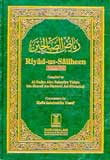Riyad Us-Saliheen (Gardens of the Righteous)

Chapter 81
Undesirability of Aspiring for Office
Allah, the Exalted, says:
"That home of the Hereafter (i.e., Jannah), We shall assign to those who rebel not against the truth with pride and oppression in the land nor do mischief by committing crimes. And the good end is for the Muttaqun (the pious and righteous persons).'' (28:83)
674. `Abdur-Rahman bin Samurah (May Allah be pleased with him) reported: The Messenger of Allah (PBUH) said to me, "Do not ask for position of authority. If you are granted this position without asking for it, you will be helped (by Allah) in discharging its responsibilities; but if you are given it as a result of your request, you will be left alone as its captive. If you take an oath to do something and then find a better alternative, you should adopt the latter and expiate for your oath.''
[Al-Bukhari and Muslim].
Commentary: By rulership is meant caliphate or any other rank affiliated to its hierarchy. Yet, it is undesirable to be eager or to strive for such an extraordinary position as it entails a heavy responsibility and one may face a sufficient difficulty in being absolved from it. However, if a man gets it without solicitation, he should accept it. The other part of the Hadith concerns swearing. Somebody takes an oath to do something but he finds another work more rewarding and righteous. In such a situation he is advised to dissolve his oath and make expiation for it. Thereafter, he will be free to avail the advantageous option. As for the expiation of breaking an oath, there are four options: to set free a slave, or to feed an average-quality food to ten needy persons, or to provide clothes to them; and the expiator who cannot afford all that, should observe fasting for three days.
675. Abu Dharr (May Allah be pleased with him) reported: Messenger of Allah (PBUH) said to me, "O Abu Dharr, I see that you are weak and I like for you what I like for myself. Do not rule over (even) two persons, and do not manage an orphan's property.''
[Muslim].
Commentary: Abu Dharr Al-Ghifari (May Allah be pleased with him) was one of the most ascetic Companions who was little interested in mundane affairs. Finding him weak to do responsible jobs, Messenger of Allah (PBUH) gave him this advice. In fact, the one who takes interest in worldly affairs and understands them well can discharge the responsibilities appropriately. But a person who has aversion to worldly pursuits and keeps clear of them will be considered unfit in this regard.
676. Abu Dharr (May Allah be pleased with him) reported: I said to Messenger of Allah (PBUH): "Why do you not appoint me to an (official) position?'' He (PBUH) patted me on the shoulder with his hand and said, "O Abu Dharr, you are a weak man and it is a trust and it will be a cause of disgrace and remorse on the Day of Resurrection except for the one who takes it up with a full sense of responsibility and fulfills what is entrusted to him (discharges its obligations efficiently).''
[Muslim].
Commentary: There are, according to this Hadith, two conditions for putting people in official positions. The first is the relevant talent for the job, a man is put in charge of; and the second is his capacity for discharging responsibilities thereof. For example, a ruler should primarily possess the ability to maintain law and order and to establish justice; and secondly, he should be endowed with sufficient dynamism and vision to cope with new demands and situations. This basic principle applies to every official, whether in the capacity of governor, minister, advisor, financial administrator or a clerk. Apart from the sense of job, ability and integrity, he should be fired with determination with regard to his work. An office is indeed an important trust, and to have it without meeting the said conditions is a sort of treachery .
677. Abu Hurairah (May Allah be pleased with him) reported: Messenger of Allah (PBUH) said, "You will covet for getting a position of authority, but remember that it will be a cause of humiliation and remorse on the Day of Resurrection.''
[Al-Bukhari]
Commentary: This Hadith urges people, particularly the incapable ones, to shed off the ambition to achieve rulership and power. It is feared that owing to their lack of talent they will mismanage the task which will be assigned to them. This will render them guilty with Allah. The Prophet (PBUH) dissuades such people from accepting any government portfolio as in this way they will remain safe and trouble-free. Yet, if a deserving person gets a job of high responsibility, he should do his utmost to do full justice to it, so that he may be spared remorse on the Day of Resurrection.
